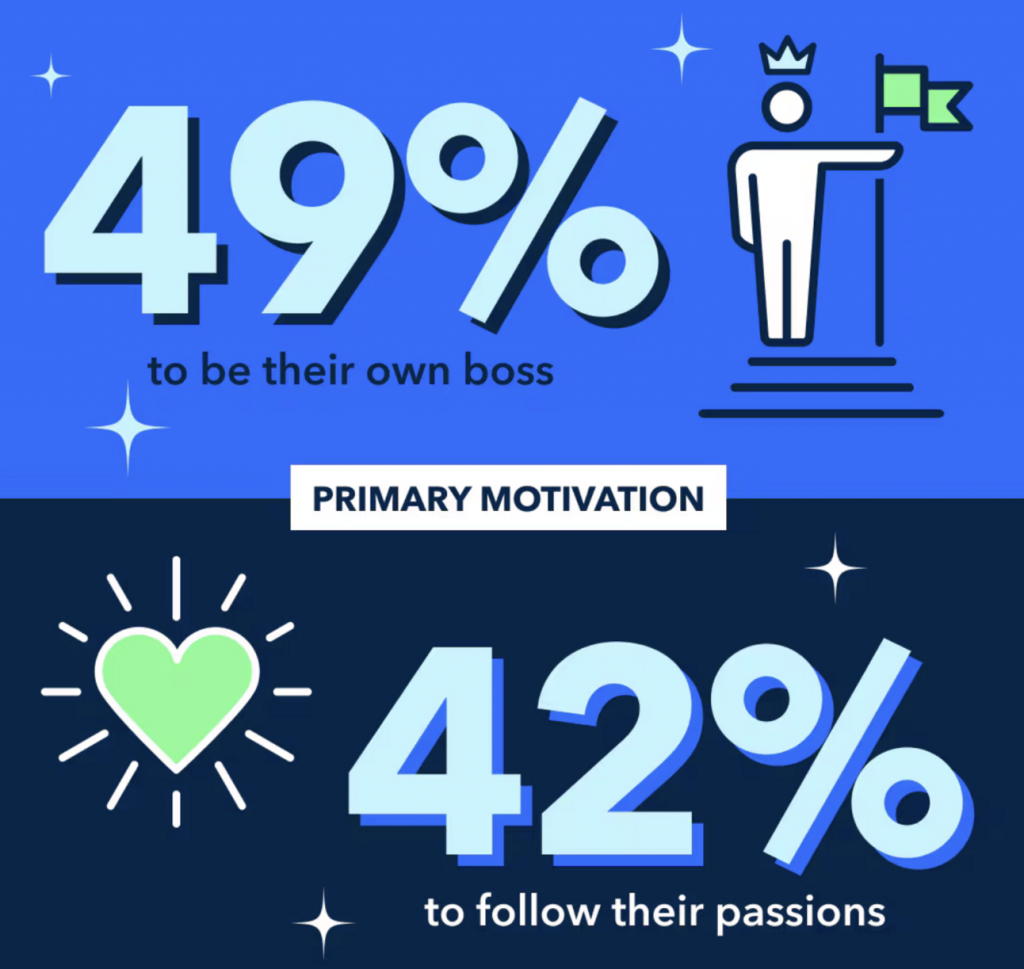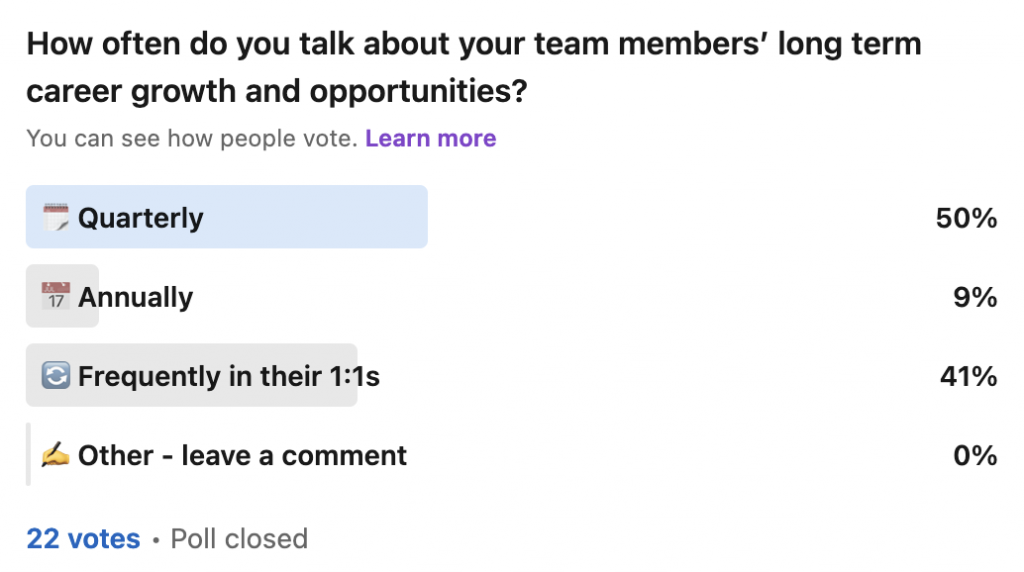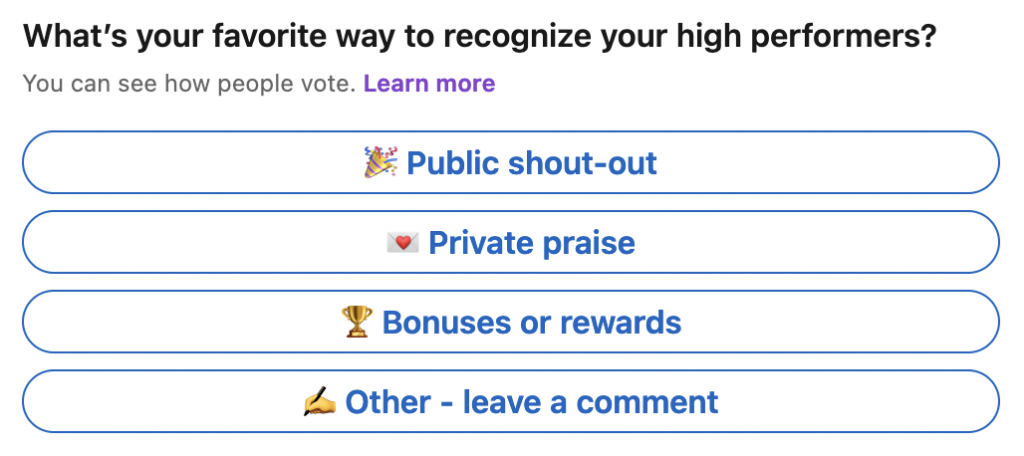Have you ever hid behind HR speak? Ever make a mistake and use legalese to cover instead of apologize?
The fear and temptation to do that can be very strong. You don’t want to get sued, you’re worried about them being upset or retaliating, or your lawyer or HR department literally told you to do it this way or else.
Unfortunately, this approach can cause a lot of damage.
The hidden cost of corporate-speak.
A lot of the most important feedback you can receive is never heard by you.
But it is heard by many others.
For example, a friend of mine had a job offer pulled 3 days before she was supposed to start. She had already given notice at her old job and was excited and ready to get started.
They gave her a vague explanation and left her to figure things out on her own.
On one hand, the company may think they dodged a bullet; she quietly accepted the bad news, and it’s on her to figure out the next steps in her life.
But there’s real damage; she’s told many people about this bad experience. The hiring manager and the company both now have a negative mark on their reputation that will have people warning others against applying there for years to come.
The dog that didn’t bark.
This is the dirty secret to these kinds of mistakes:
- You don’t know about the great candidate who never applied.
- You don’t notice all the people who now won’t share your job postings.
- You don’t know who may be making a purchasing decision for your product and recall how your company treated their friend.
This is how you lose deals, and great talent, without realizing it.
So next time you’re tempted to use HR-speak or legalese instead of being honest, consider if it’s really worth the long term reputational damage.
As we head into the holidays, we have some great bite-size leadership content for you. Let’s dive in…
Table of contents:
- 🥘 Food for Thought on The First Agreement
- 📰 News & Reports for Managers on The Side Hustle Generation: Good or Bad for Managers?
- 📖 Your Leadership Long Read on Inspiring Quotes from Great Leaders
- ❓ Poll of the Week on Your Favorite form of Praise
➡️ Did a friend forward this to you? Get every issue straight to your inbox by signing up here.
Note: This is a preview of our weekly leadership newsletter, Lighthouse Leadership Weekly (LLW).
To get this sent to your inbox every week, along with our latest long form essays on this blog, you can sign up here.

🥘 Food for Thought
This month’s Book of the Month is the classic, “The Four Agreements” by Don Miguel Ruiz.
And today, I want to talk about the importance of the very first agreement from the book:
The First Agreement:
“Be impeccable with your word”
Are you impeccable with YOUR word?
As we come to the end of the year, it’s a great time to look back and ask yourself some hard questions.
And for your own personal growth and development as a leader, keeping your word is one of the most important things you can do. That makes it a great topic to reflect on at the end of the year: Do you keep your word consistently?
While it’s good for everyone to keep their promises and commitments, this is especially true for leaders.
Here’s what happens if you don’t:
- Your team won’t trust you: There are few things that build resentment on a team faster than a “Do as I say, not as I do” kind of leader.
- Your team won’t believe you: Saying the right thing is great. It can relieve tension, make people feel heard, and provide a spark. But if you don’t follow through on it, you’ll make your team feel burned.
- Your team won’t follow you: Who wants to follow a leader who makes loud proclamations, and then never delivers? (No one.) Leadership is earned every day with how you do (or don’t) show up and take action (or don’t).
That’s why as we wrap up the year it’s worth looking back and thinking about this in more detail. Because it’s a lot more than a quick thought of “oh yeah, I do what I say…”:
- Did you keep your promises about advocating for raises and promotions on your team? Few things will make your team resentful as much as failing here.
- Did you fix the problems you agreed to? Did you do what you told your team you would do? You can’t expect your team to be consistent if you’re not.
- Did you follow through on what you told your manager and peers you would do? You won’t get many favors, nor help if you fail to hold up your end.
- Where might a critic say you weren’t impeccable? Sometimes we lie to ourselves, but a devil’s advocate approach can break free from that to be more honest with ourselves.
- Where did you only partially keep your word and what did you do about it? There can be shades of gray on keeping your word, so be sure to evaluate times where you fell short but did make some effort.
- How does your team react when you make a promise? Are they eager and excited, or checked out and eye-rolling? This tells you a lot about your reputation, if you’re paying attention.
- What does your 360 feedback say about your word? Sometimes people will come right out and say it, and other times you need to read between the lines. Take another look at your review to see if any sound like you’re not trusted or keeping your word.
- What does your team say when you ask them 1 on 1 about if they think you’re impeccable with your word? You can’t ask your team in a group (it’s too much pressure to say nothing), but you can ask them 1 on 1. When you do, keep in mind that long-winded, diplomatic answers, or silence are both bad signs for you.
Your word is your foundation as a leader.
Maybe some of those questions are uncomfortable for you to ask.
Maybe you came up a bit short with some of your team or peers this year.
Maybe this issue is staring you right in the face and you know it.
The good news is that you can change that. Start today being consistent. Take every promise, commitment, and word you write seriously.
You don’t build a reputation overnight, but people will notice you’re different if they see you deliver repeatedly and consistently going forward.
Just remember the important lesson from Clayton Christensen as you set out to be better at this:
“It's easier to hold your principles 100 percent of the time than it is to hold them 98 percent of the time.”
This is why the First Agreement says to be “impeccable” and not simply “pretty good” or “relatively consistent”. Keep your word 100% of the time.
If you’d like to learn more about how to apply the Four Agreements as a leader, we have a post breaking down all of them and how they can help you be a better leader here.
📰 News & Reports for Managers
Intuit’s study of side hustles shows young generations are very invested in them
Do your team members have side hustles?
If they’re a Millennial or Gen Z worker, there’s a good chance they do.
Intuit surveyed 1,000 workers aged 18-35 to help better understand their views and habits around side hustles.
Here’s what they found, and how it’s relevant to managers like you:
1) Side hustles are more common than you may think
From the report:
- 55% of respondents say they have a side hustle
- Of those with a side hustle, 65% of them intend to continue working on them in 2025
Now, think about your team. How would you feel if roughly half of your team had side hustles? Who do you think would have one, and who wouldn’t? It’s a helpful question to ask yourself, regardless of how you feel about such things.
2) Independence and passion drive side hustles
Why would someone want to do more work, after working their day job? The answer is simpler than you may have expected:

This is a super valuable insight for leaders if you pause and think about it. These are the same ways you can motivate your team at work:
- Passions: If you find someone on your team is super fired up or interested in a project or task, let them do it! They’ll do better work than someone else who sees it as a chore, and the passionate team member will enjoy work more while doing it.
- Independence: What being your boss is really all about is not feeling like you’re bogged down by draconian rules or constantly micro-managed. If you’re guilty of either of those, consider how you can give especially your best team members a bit more freedom.
3) Side hustles are perceived as low risk and quick reward.
While I have yet to see data that shows the success rate of startups has suddenly increased significantly, it’s important to note that the bar for side hustles is very different from all-in full time ventures.
A side hustle can make you an extra $500 a month and totally be worth it, but you’d never want that to be your full time income.
That’s why I’m not entirely surprised that the Intuit survey found these results:
- Only 3% of respondents reported failing at their side hustle, with most pivoting quickly if things don’t pan out
- On average, respondents reported that profitability is achieved within 3-6 months
If 97% of those with a side hustle found some success, then it suddenly makes a lot of sense that we see the majority of young workers have one; it means you’re virtually certain to at least have a friend or two that started something and made money doing it.
And knowing you can see payoff in just a few months removes even more of the hesitation you could have.
Which leads us to the really important question for leaders:
Should you support your team in their quest for side hustles?
There is no cookie-cutter, always this way kind of answer for things like this. Some companies have very strict policies that this is not allowed, while others openly encourage it.
And things only get murkier when state laws come into play and can make it either easier or harder to police or permit. (As always, consult with your internal HR/legal teams if you have questions like this for your company)
That’s why I’m going to walk you through the pros and cons of your team having side hustles.
Pros of letting your team have side hustles:
- Your best people will do it: Side hustlers are usually motivated to perform, and get things done efficiently, which is exactly what you want in a team member. You could lose them if you ban the practice.
- Side hustlers are always learning: The new skills they learn can be used in their job with you, and come from learning on their own time, which is always great.
- Side hustle knowledge can apply at work: Things they learn getting their side hustle going is often useful at work from hiring to new tools they’ve used to AI assistance. That’s a lot more valuable than the employee who goes home and watches Netflix every night.
Cons of supporting team members having side hustles:
- You might lose them to the hustle: While many side hustles stay just that, sometimes they really take off. Everyone has their number where they’ll quit their W2 and go full time, so there’s a risk this happens with your team members doing it.
- They might join another company: If someone is rapidly building new skills and trying new things, they’ll often become hungry for more at work, too. If you don’t feed that hunger and help them thrive, they may go work at another company that will pay them more to take on challenges based on the skills they added on their own.
- They’re more restless and demanding: Once people get a taste of how fast you can go without endless meetings and red tape, it can be addictive. That means they’ll have less tolerance for the same old annoyance at your company, or simply doing the same boring job with no new challenges.
Personally, I love team members who are side hustlers. Yes, they require more structure, a different kind of oversight, and more opportunities for growth, but the payoff is huge.
They often are more loyal, hard-working, and diligent than other team members, and the knowledge I mentioned in the pro’s above is 100% real. They often know about tools and tactics before I do, even though I try to stay up on things through X/Twitter.
That said, if you end up being supportive of side hustles, too, remind your team:
- Expectations: Their time is their own, but you expect them to be present and focused on work at work.
- Work comes first: Side hustles are never an excuse for failing to get work done for you
- Separate church & state 100%: Never do any work using company devices, internet, or resources. Don’t even borrow the printer, stapler, or a quick phone call, or they risk the company legal department coming after them.
- Keep it quiet: Don’t talk about your side hustle at work unless it’s abundantly clear that’s okay in your culture. Otherwise, “out of sight, out of mind” is the best approach where company policy is murky or unfriendly to it.
- Be fair on both sides: To really make this work, it’s best to make a mutual commitment: you’ll support them and they’ll be fair to you with their day to day effort, and they’ll help with a smooth transition if they ultimately decide to leave.
In the right circumstances, and with a little extra effort, side hustles can be a win-win. Yet, they’re not for everyone.
=> How do you feel about side hustles? Reply and let me know.
📖 Your Leadership Long Read on Inspiring Quotes about and from Great Leaders
There are great leadership lessons all around us, if you pay attention. And one of my favorite places to find them is on X/Twitter.
Over the years, I’ve collected a number of my favorite ones, which you can find in this week’s post.
Give it a quick read through and you may find one that either deeply resonates, and you want to share, or that really makes you think, and you’ll save for later.
See which of the 18 I’ve picked out resonate by reading the post here.
❓ Poll of the Week
Last week we asked you about your habits talking about people’s careers, and I was happy to see the results:

While it’s a small number of votes, knowing 91% of leaders who responded are talking at least once a quarter about their team members careers is a great trend; when I started Lighthouse in 2014, almost everyone was only talking once a year about it. Waiting that long is a recipe for disaster.
If you’re not sure how to have these conversations outside review time, start here.
—
Now, this week, we shift to a question about another habit that matters for managers: how you prefer to give praise and recognition.

We’ve shared many times in this newsletter how important it is to give praise, so now I want to know which method is your favorite. Tell us now and see what others chose by taking the poll here.
Sign up to get this newsletter & our latest blog posts straight to your inbox:




